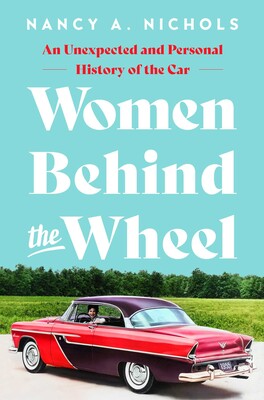I’ve exceeded the speed limit on Texas interstates, spun around after taking a turn too fast, and once changed my outfit while driving. I learned to drive in a 1971 three-on-the-tree Chevy pick-up and my daily driver is a six-speed, turbo-charged Japanese fast hatch. I bought the car from a woman at a large dealership staffed mostly by men. Is driving while female really the revolutionary concept it once was?
According to Nancy A. Nichols’s Women Behind the Wheel, the idea of women drivers as something other than an oddity has taken decades to mature from novelty trailblazers such as Bertha Benz who hijacked her husband’s “Patent Motor Wagon” in 1888 to the more than 120 female NASCAR drivers on the starting line since the sport began in 1949. (It is odd that Nichols does not mention one of literature’s first women drivers, the intrepid Claire Boltwood in Sinclair Lewis’s 1919 novel Free Air.) No one questions the presence of women on the roads, although there are plenty of jokes about them, but what Nichols, a seasoned reporter and writer, wants to explore is “how the car came to be our most gendered technology.” At this late remove, haven’t we all made our peace with the fact that some cars are chick cars and some are muscle cars, and that’s just how it is? If that is the case, the subtitle of Nichols’s book—“an unexpected and personal history of the car”—is all the more welcome.
An energetic and engaging writer, Nichols might have clogged her book with citations from the numerous sociological studies and books that examine women drivers—safety statistics, insurance costs, buying preferences—and she does call on them when it suits her point. A point which is, it must be said, one that often verges on joyless censoriousness. Time and again, Nichols relates the ways in which the car has changed women’s lives; as a wife, mother, and professional writer, she testifies to how at various times in her life, the car has been shelter, confessional, mobile political statement, and cultural touchstone. But women have paid the price, Nichols notes. She relates that women drivers experience more stress, they have more accidents, their children may experience birth defects caused by car exhaust, they are slow adopters of new technology such as electric vehicles, and they are complicit in the “great consumer lie that is car culture.” Most of all, cars and their environmental consequences (fossil fuels and all that plastic) have occasioned a great deal of pearl-clutching.
